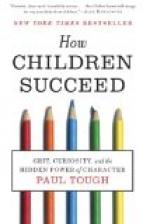|
This section contains 684 words (approx. 2 pages at 400 words per page) |

|
How Children Succeed: Grit, Curiosity, and the Hidden Power of Character Summary & Study Guide Description
How Children Succeed: Grit, Curiosity, and the Hidden Power of Character Summary & Study Guide includes comprehensive information and analysis to help you understand the book. This study guide contains the following sections:
This detailed literature summary also contains Topics for Discussion on How Children Succeed: Grit, Curiosity, and the Hidden Power of Character by Paul Tough.
How Children Succeed is a collection of Paul Tough's research on child development and educational reform in America, particularly as it affects at-risk children living in poverty.
In the introduction, author Paul Tough introduces the book's central argument, that character development is more important to a student's future success than his or her IQ. Tough visits a new school, Tools of the Mind, which focuses primarily on character rather than cognitive skills as a way of preparing young learners for their academic futures, even though this practice goes against the mainstream belief that cognitive development, which arguably leads to a higher IQ, is the best head start for toddlers. By recapping a series of educational experiments and research, Tough creates an atmosphere of interest and concern about the American school system, particularly its effects on at-risk students. Already in the introduction it's made clear that studies show that students with a specific set of character traits, "persistence, self-control, curiosity, conscientiousness, grit, and self-confidence," seem to have a much higher success rate than students without them, leaving Tough to question whether these traits can be trained or if they are innate, and what programs can be made available to both teachers and students to ensure effective educational reform.
In Chapter One, "How To Fail (And How Not To)," Tough introduces the reader to two women making great waves in educational reform: Nadine Burke Harris, a researcher who studies the biological effects of stress on children's lives, and Elizabeth Dozier, the principal of Fenger High School, one of the worst high schools in the United States, and a school that will be a focal point of much of the novel. Together with her fellow researchers, Burke Harris devised a system of recording traumatic events in her patients' lives, and after collecting their personal histories, assigned each an ACE (Adverse Childhood Experience) number. Her results showed that patients with high ACE numbers were not only at higher risk for medical conditions (such as anxiety, depression, and cancer), but children with high ACE numbers also performed poorly in school and had a lesser chance of success in their adult lives than students with low ACE numbers. Research also showed that students with high ACE scores struggle to make secure attachments to their caregivers, another important facet of later success.
Chapter Two, "How to Build Character," focuses on Tough's primary message, that character development is more important than IQ in determining a student's future success. Throughout this chapter, Tough compares two vastly different schools: KIPP, an education training program for at-risk teens in inner city Chicago, and Riverdale, an affluent school in one of the richest neighborhoods in New York. The principals of both schools, although dealing with very different students, both believe that having grit, determination, and self-control is more important than academic intelligence. Tough goes on to discuss a variety of programs in which it was discovered that when students feel motivated and determined to succeed, their IQ tests higher. Essentially, Tough argues that teachers must convince their students that everything about them, from their IQ to their personality, is malleable and can be altered or transformed when properly trained.
Chapter Three focuses primarily on a New York educator, Elizabeth Spiegel, and the work she's done with inner city youths through her chess program. Tough is particularly drawn to Spiegel because her lessons, like those of the successful educators discussed in previous chapters, focus on two executive functions: cognitive flexibility (the ability to see alternative solutions to problems), and cognitive self-control (the ability to substitute more effective, less obvious solutions for natural reactions). In her own way, Spiegel is teaching her chess players grit, curiosity, self-control, and optimism.
In the remaining two chapters, Tough explores additional movers and shakers in education reform, following their inventive programs and the effects made in disadvantaged communities. What ties all of these stories and experiments together is the resounding message that character development is more important than intelligence, every single time. Tough's message throughout the novel is clear: teachers, not students, are the key to the future.
Read more from the Study Guide
|
This section contains 684 words (approx. 2 pages at 400 words per page) |

|



